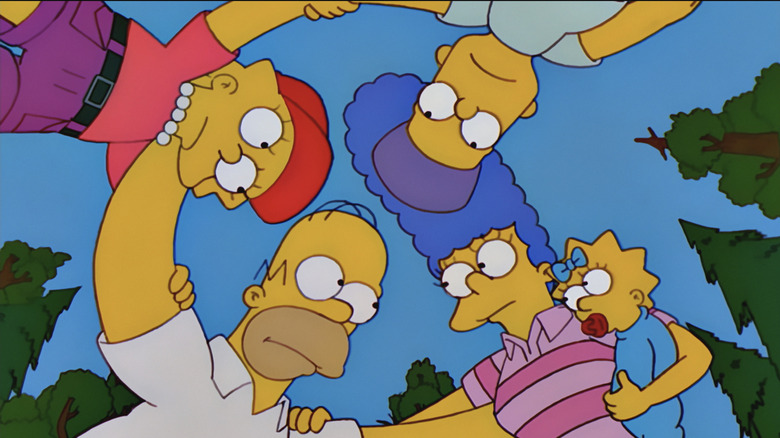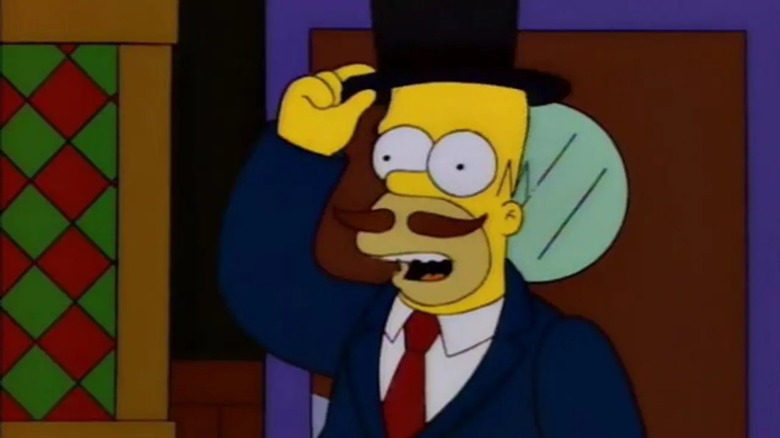How James L. Brooks And A Little 'White Lie' Got The Simpsons Greenlit By Fox
It's always been extremely difficult to get a television show greenlit on a major network. Creatives seemingly need to jump through endless hoops and pass all sorts of tests, and in the end, it can all come down to the personal whims of some executive.
It's hard to believe that a show like "The Simpsons," which has been around for more than 30 years at this point, also at one point struggled just to get made. While these days it seems like anytime show creator Matt Groening sneezes two more seasons of the show appear, bringing the first 13 episodes of the series to life took a lot of convincing on the part of the show's creators.
A different tactical plan
Groening, who was at that point best known for writing the comic strip "Life in Hell," came up with his pitch for "The Simpsons" somewhat last minute. It's important to note that there are those who dispute that claim. Groening wanted to make a show that skewered the traditional idea of a family sitcom, a series that has aptly been described as "the family sitcom from hell."
While the executives from Fox were definitely interested in buying some work from Groening, the real struggle the team at "The Simpsons" encountered was getting the network to buy a full 13 episodes instead of just six. Fortunately for them, they had director and screenwriter James L. Brooks on their side, as well as the ability to lie, according to the "Icons Unearthed" YouTube series.
Brooks, a director known for movies like "Terms of Endearment" and "As Good As It Gets," wanted to produce whatever Matt Groening created, and he helped the show gain leverage in its negotiations with Fox. "Jim Brooks, he wasn't gonna take less than 13 [episodes], and my management at the time wasn't gonna take a swing at that level," said Rob Kenneally, a former Fox executive. Conveniently for Brooks, he had a film deal with the company that was due to be renewed, which he used to guarantee the network picked up "The Simpsons." Kenneally continued, "When his film deal renewed, 'The Simpsons' was part of it."
'A little white lie'
Brooks wasn't the only one working hard to get those 13 episodes. Another executive, Garth Ancier, took a more deceptive approach. "I agreed to tell a little white lie to our management," said Ancier. He told his boss, Barry Diller ("the one guy you don't lie to"), that ABC had offered "The Simpsons" six episodes, though he wasn't certain it worked. "In fairness, because I do think Barry has an extraordinary bulls*** meter, I think he knew it was a lie and he went along with it anyway knowing this was a good idea. That's what got Barry to order 13."
Whether it was that little white lie or Brooks' industry pull that did it, "The Simpsons" did get all 13 episodes they wanted. And now that little cartoon (don't tell the creators I called it that) has survived over 30 years, so it's obvious that Fox made the right call. Diller himself would later call "The Simpsons" the most interesting show on television, and the show's longevity and cultural impact sure seem to support that.
Barry Diller had another important role to play in "The Simpsons." In a TV Guide story from October 2000 (via Fortune) Matt Groening said that the inspirations for Mr. Burns' personality were oil tycoon John D. Rockefeller and the "It's a Wonderful Life" character Henry Potter. But according to supervising director David Silverman, Burns' actual appearance was based on Diller.
Diller himself apparently didn't pick up on this; when asked if Mr. Burns was based on him in a SiriusXM interview, he said, "No! I bear no resemblance to Mr. Burns. Physically, emotionally, intellectually, [or] morally."


